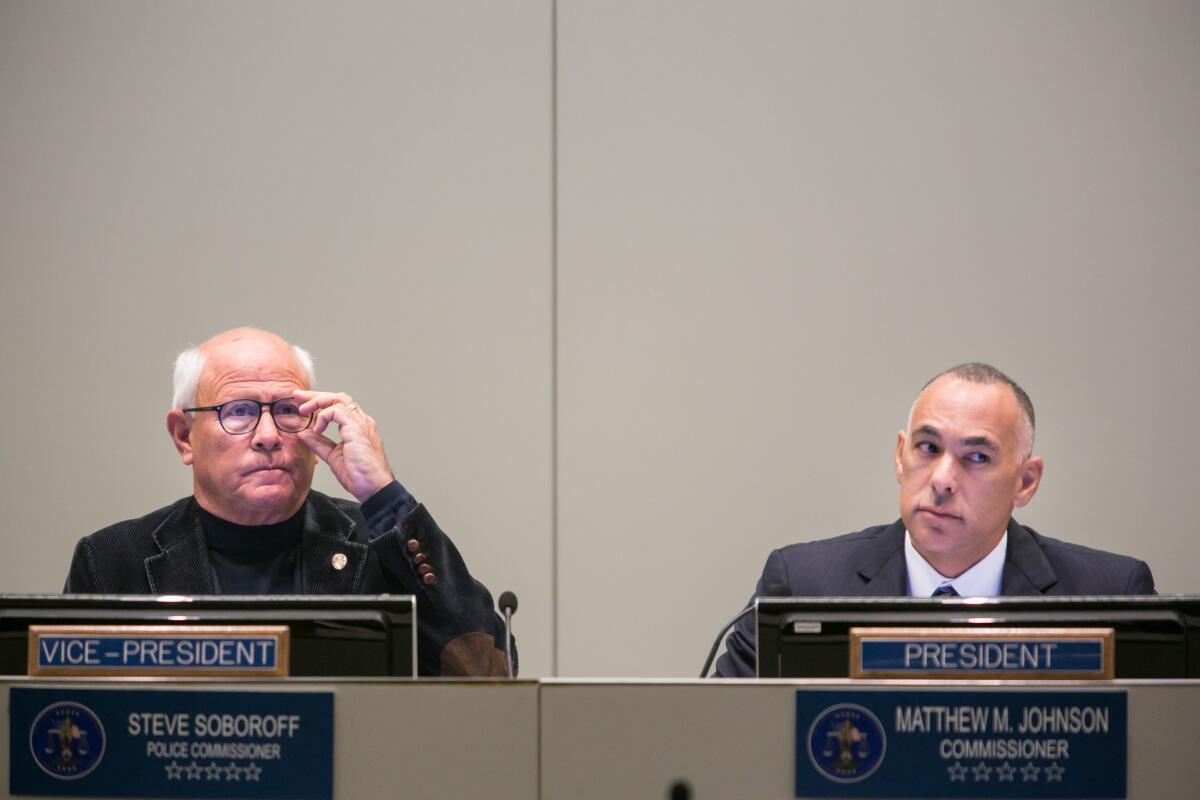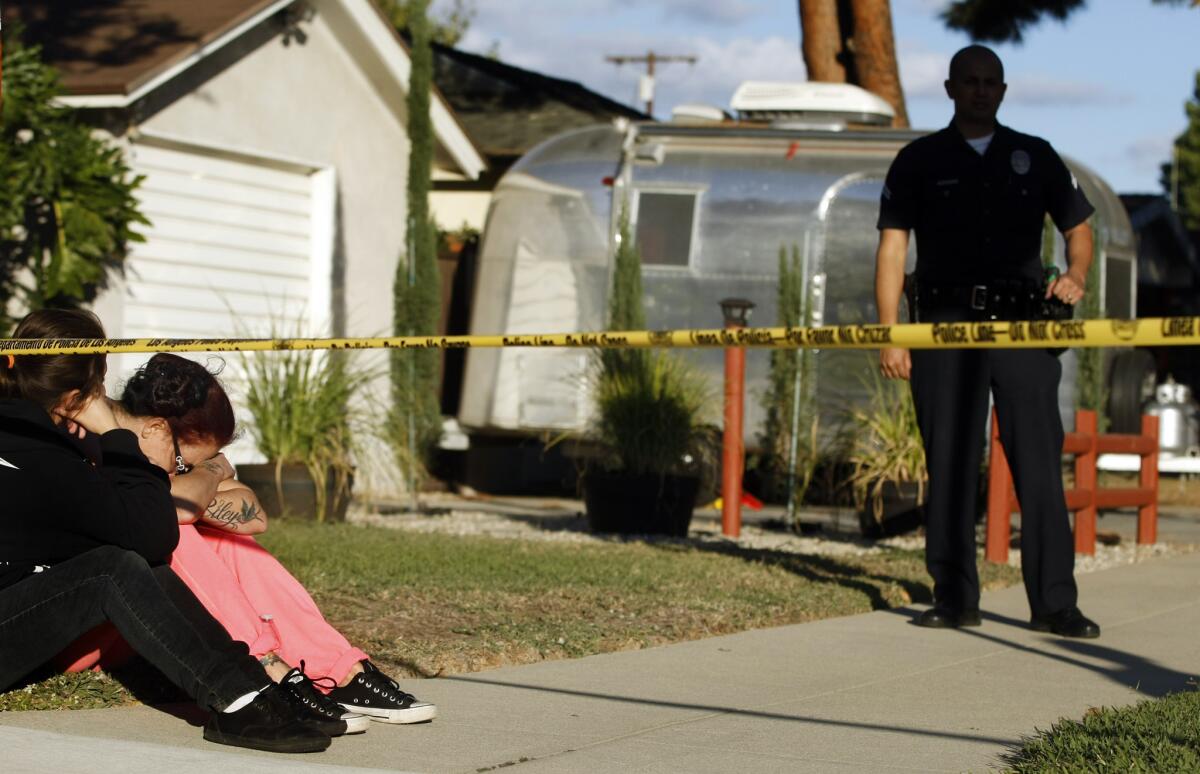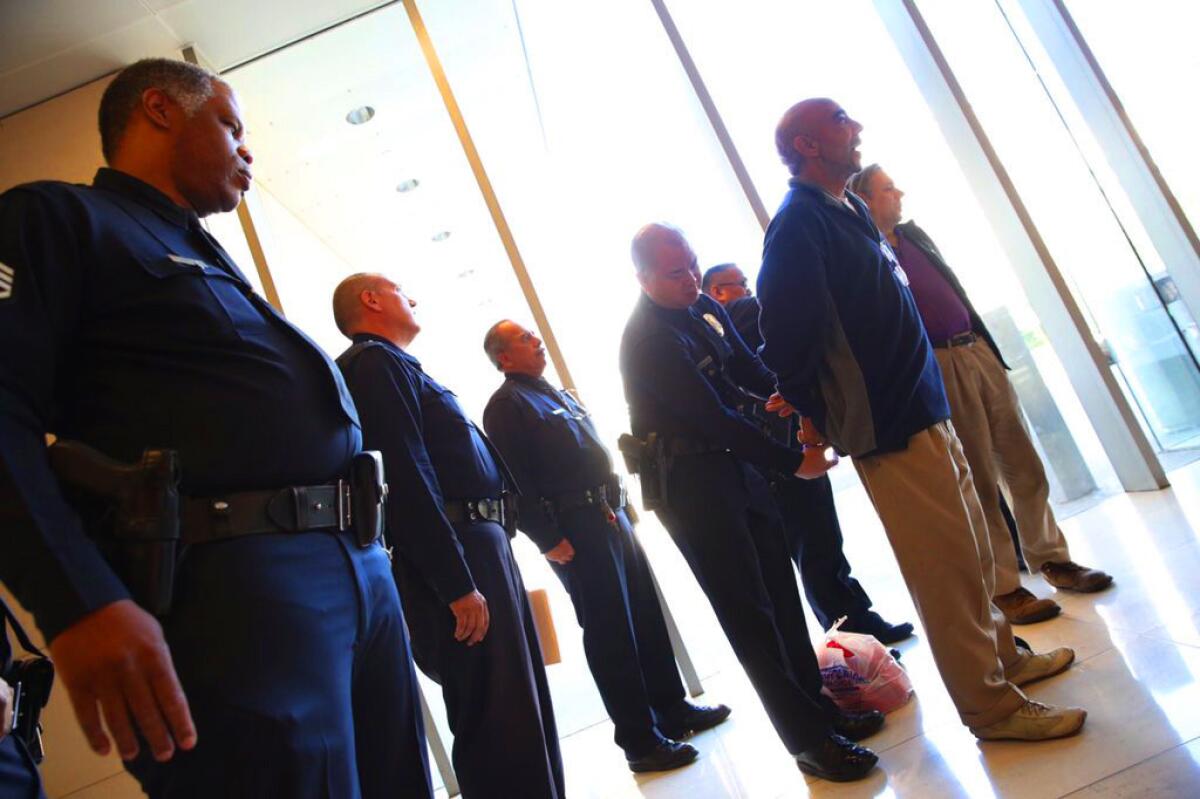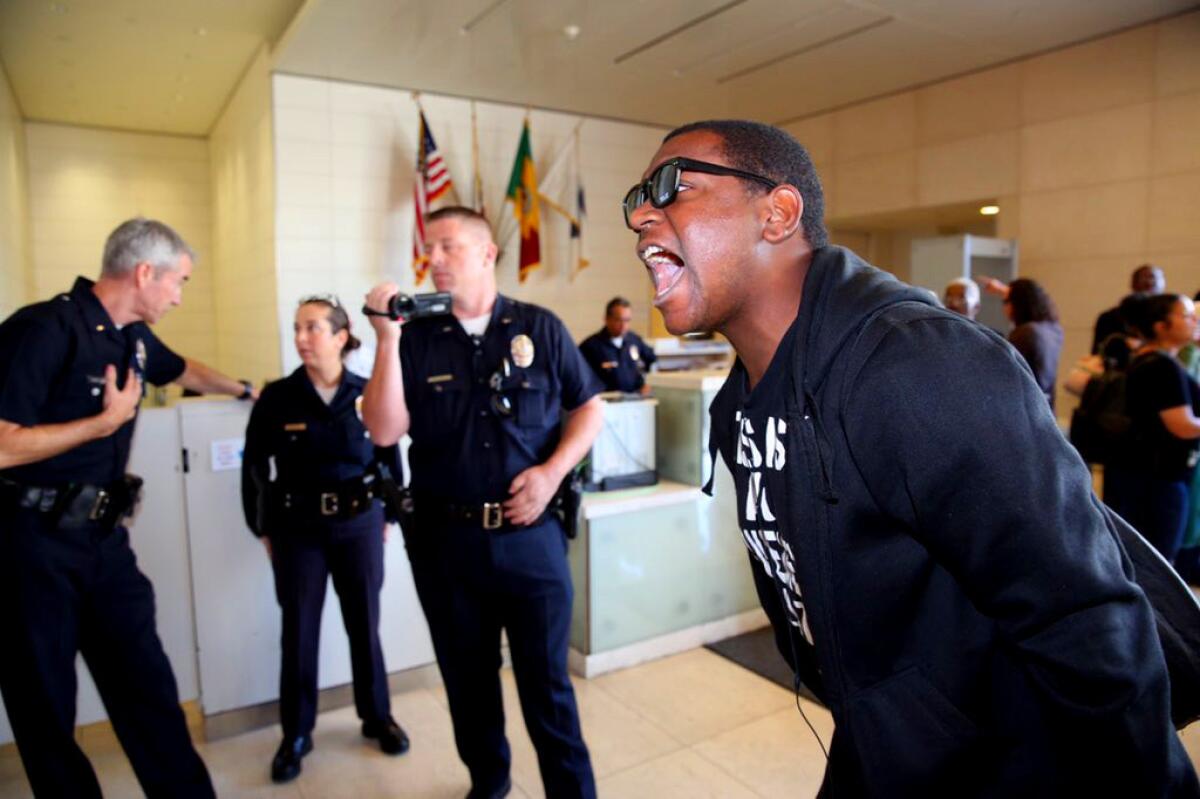Shootings by LAPD double in ‘alarming’ trend, police commission president says

Police Commissioner Steve Soboroff, left, and Matthew Johnson, the panel’s president at Tuesday’s L.A. Police Commission meeting.
In a year dominated by heated debate over police use of force, the Los Angeles Police Department has seen a significant uptick in the number of times officers have fired their guns.
Officers have opened fire 45 times this year, compared with 23 instances during the same period in 2014. Nineteen people have been killed by police gunfire, including a man shot earlier this week.
On Tuesday, the new president of the Police Commission described the trend as an “alarming development” as he proposed an aggressive effort to study and attempt to reduce the number of times officers use force.
To accomplish that, board President Matt Johnson requested an extensive analysis spanning the last decade of instances in which police have used force and how that compares to other major police departments. He also asked for reviews of the LAPD’s new body cameras, training and less-lethal equipment, like Tasers and beanbag shotguns.
“Despite the progress the LAPD has made, we are living in challenging times. The LAPD, like police departments across our country, is facing a crisis of confidence with minority communities, particularly African Americans,” said Johnson, the commission’s only black member. “My goal is to use these challenges as turning points and make the LAPD the model for the entire nation.”
Johnson’s agenda marks the latest sign that the Police Commission, the civilian board tasked with overseeing the 10,000-officer LAPD, is taking a harder public stance on deadly force.
The five-member panel has operated under more public scrutiny since this summer, when it overruled LAPD Chief Charlie Beck and decided that the fatal shooting of a mentally ill black man in South L.A. last year violated department policy. The decision marked a significant departure from the way the board evaluated police shootings.
Although the commission reviews every shooting and serious use of force by officers, state law mandates that those discussions occur behind closed doors, where they are limited to single cases. By asking for the reports on force, Johnson and his fellow commissioners will move the conversation into the public arena.
There have been other indications in recent weeks that the commission was taking on a more visible oversight role. This month, Johnson opened a weekly board meeting by expressing concern about a string of fatal police shootings. A few days later, he told an angry crowd at a South L.A. town hall meeting that he did not “accept where we are today as a police department.”

Friends of the victim grieve near the scene of a police shooting Monday in Northridge. The new president of the Los Angeles Police Commission called Tuesday for the LAPD polices the city.
The number of times LAPD officers have shot suspects has fluctuated over the years, according to LAPD data reviewed by The Times. The number of fatal shootings so far this year is the highest since 2011, when 26 people were killed.
Since the fatal shooting of an unarmed black teenager by a police officer in Ferguson, Mo., last year, protests have been held across the country — including Los Angeles — over concerns about the way police use force, particularly against black men.
Two days later, LAPD officers fatally shot Ezell Ford in South L.A., setting off demonstrations that culminated earlier this year when the Police Commission overruled Beck’s decision that the shooting was justified. Even though Ford was struggling over an officer’s holstered handgun when he was killed, the commission ruled that one officer’s handling of the encounter was so flawed that that it led to the fatal confrontation.

A protester is handcuffed at the L.A. Police Commission meeting.
The LAPD has grappled with other high-profile shootings this year.
In March, officers fatally shot a homeless man on skid row in an incident caught on video. About two months later, an LAPD officer fatally shot a homeless man in Venice in an encounter that prompted the LAPD’s chief to say he was “very concerned.” Investigations into the shootings are continuing.
On Tuesday, Mayor Eric Garcetti praised Johnson’s agenda, saying “thoughtful leadership and strong civilian oversight” would help “improve ways to handle use of force in policing.” Other police commissioners also backed him.
“We have not had substantive discussions in public about policies and statistics, and the way Matt has proposed doing this, we will do that,” said Robert Saltzman, a longtime commissioner.
In an interview, Johnson, who joined the commission nearly two months ago, said he hoped his agenda would signal that the panel intends to fulfill its oversight role.

An L.A. Police Commission meeting last year is disrupted by members of Black Lives Matter L.A.
“I didn’t agree to join the Police Commission and I don’t believe I was appointed by the mayor to the Police Commission just to go along with the status quo,” he said.
Johnson said he looked forward to working with the LAPD on the initiatives and praised the department for steps it had already undertaken: the community-policing model used in some of the city’s housing projects, the implementation of body cameras and wider distribution of Tasers.
But, he said, he would like to see more beanbag shotguns distributed to officers to maximize the effectiveness of less-lethal options. Johnson said it was “an encouraging start” that the LAPD was training officers how to reduce tension and potentially avoid using force during encounters with civilians, but said there must be “enthusiastic acceptance” at every level of the LAPD for de-escalation training to be effective.
“Culture and habits do not change overnight,” he said. “We will have to reward excellence and hold accountable those who do not comply. We cannot expect to change behavior if there are not real consequences for those found to be out of policy.”
Beck said that the LAPD supported Johnson’s initiatives and that it was important to understand the factors contributing to the rise in police shootings and see how other departments are addressing the same issues.
“We both want to get to the same place,” Beck said. “This is a conversation that is made stronger by multiple voices.”
Johnson’s agenda also focused on reducing the crime that has risen across the city, saying effective and expanded community policing efforts were a key solution. He called on residents for help.
“Respect is a two-way street,” he said. “Communities and police in Los Angeles must work together.”
Not everyone has been supportive of the Police Commission. A group of activists critical of the board and the LAPD have routinely attended — and disrupted — the panel’s weekly meetings, including Tuesday’s. The room was cleared, and two men were arrested, before Johnson was able to outline his plan.
Melina Abdullah, who is affiliated with the local chapter of the Black Lives Matter movement, was one of the activists cleared from the room. She said she supported the idea of changing the LAPD, but the key would be whether Johnson’s initiatives resulted in reform.
“To say that you’re going to do something and to actually do something are two different things,” she said. “We want change, but we’re going to remain cautious.”
John Mack, a civil rights leader who spent eight years on the Police Commission and served as its president, sat in the front row at Tuesday’s meeting — the first he had attended since leaving the board in 2013, he said.
Mack said Johnson and the rest of the board were tackling important issues, like police shootings, public transparency and respectful policing. Also important, Mack said, was Johnson’s signal to the department that the commission intended to support the LAPD when appropriate but also hold officers accountable when necessary.
“Matt Johnson sort of reminded everybody that we’ve made great progress, but we intend on bringing about some significant institutional reforms,” he said. “It’s important that the commission and the department not rest on its laurels.”
Follow @katemather for more LAPD news.
ALSO:
Bus passenger stabbed to death in Highland Park
Man denies killing San Bernardino police officer in drunk driving crash
Burning SUV in Orange yields grim find: 3 bodies; homicide probe launched
More to Read
Sign up for Essential California
The most important California stories and recommendations in your inbox every morning.
You may occasionally receive promotional content from the Los Angeles Times.











